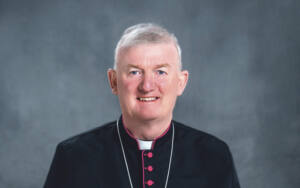
WelCom May 2024
Bishop John Adams, Bishop of Palmerston North Diocese
There are a number of issues that the modern secular world is reluctant to speak about. One of them, it seems to me, is our finitude. Finitude is the acceptance that our length of life here on earth is limited. All of us will one day die, despite this truth one of the great preoccupations in human history has been the quest for immortality. People have looked for centuries at ways to extend our lives beyond their natural end. Still today, billions and billions of dollars are spent looking for ways to lengthen human life beyond its natural end. To some extent this is understandable – none of us wants to die, all of us have a certain fear of death.
During this Easter season I think it’s worth asking, has our desire to endlessly extend our earthly pilgrimage gone too far? Have we become so averse to risk that we become timid and joyless? Is the great delight of human adventure being extinguished? Are we becoming so bound up by laws and decrees, rules and regulations, all designed to protect us, that in fact we are not ‘living’ in the full sense of the word?
My school board of trustee experience has alerted me to the tremendous amount of paperwork needed for our young people to experience the great outdoors. I fear our children are becoming over protected so that stubbing toes, falling out of trees, crashing bikes, skinning knees, falling in creeks – the life experiences that once moulded us into prudent yet adventurous people – are becoming consigned to history.
The absence of adventure produces a culture that can struggle disproportionately with adversity. Active engagement with physical challenge is being replaced by hours gazing at flat-panel displays. Screens that ask nothing of us other than passive observance. Are we running the risk of raising a generation of children who are discovering, too late at the wheel of a powerful car, about risk and how to handle it?
My own thinking is that as faith in a loving and merciful God declines, so too does an absolute fear of death increase. We begin to spend a disproportionate part of our lives on self-preservation and the urgency and desire for science to conquer the inevitability of death leads to the worship of a different God, the god of scientific progress.
But let’s stop and think for a moment. Let’s imagine that science may one day find a way to extend human life for say another 20 or 30 years. Or perhaps even sometime in the future death will be able to be warded off indefinitely; we might all live to say 400. How would that look?
Humanity would become extraordinarily old; our young people would become a tiny minority. The passion, capacity for innovation, and the joy that young people bring would be crowded out by the demands of the aged. Suddenly this quest, this deep desire of us all to avoid death, would not lead to paradise, if anything we would start to experience a type of endless hell. Permanent life in this world is surely not the answer.
The bold Christian answer to finitude is not endless life on earth, it is the empty tomb. Yes, the elixir of life is Jesus, both ‘doctor and medicine’ as St Thomas Aquinas described him. The true remedy for the despairing thought of an endless journey of life in this world has been found, it’s the risen Jesus. Jesus Christ is the cure for death. Jesus Christ is the answer to human longing. Jesus Christ is the end of the quest for life’s meaning and purpose. It is Jesus of Nazareth, risen from the dead, who gives solace to the deepest longings of our hearts.
It seems to me that this is the excitement of Easter morning. Jesus has conquered death. The darkness of perpetual struggle on this planet has been banished. And even though for most of us a certain fear of death remains, it is tempered by our faith in Jesus Christ, the author of life.
Let’s take seriously the assurance of Jesus who told us he has come so that we might have life to the full. An overly careful and timid life is not a truly Catholic life. No, to be ‘all in’ as a Roman Catholic is a great and rare adventure. CS Lewis wrote once that when this life is over, we would only have completed the cover page of the great book of life. He went on to say that: …at our death we begin chapter one of the ‘Great Story’ which no one on earth has read; which goes on forever; in which each chapter is better than the one before…
What a beautiful and life-giving thought this is.